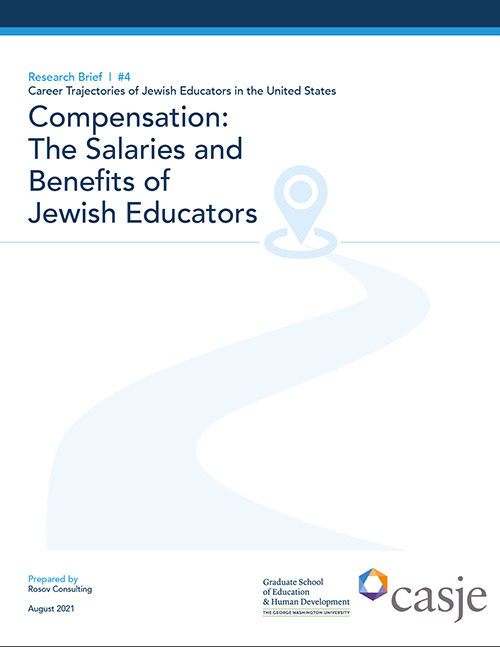
The Collaborative for Applied Studies in Jewish Education (CASJE) is a community of researchers, practitioners and policymakers dedicated to improving the quality of knowledge that can be used to guide Jewish education and learning. This recent study is the fourth of a series that shares findings on career trajectories of Jewish educators.
Key findings from this sample of 1,300 Jewish educators from around the country include: The mean salary for all full-time respondents is around $63,000, but there are significant patterns of variation among subgroups. For example, the mean salary of full-time supplemental school educators is more than $70,000, while that of full-time early childhood educators is $40,000. On average, female respondents continue to be paid less than their male peers. Early childhood education continues to lag in salary and benefits. Teachers with higher salaries have positions that add administrative work to their teaching.
While a majority of full-time teachers report receiving paid vacation and medical insurance benefits, there are still many others (approximately one-third) who report that they do not receive these benefits. While overall, compensation does not have a strong relationship with career commitment, those who have left the field or are strongly considering doing so cite salary and benefits as major factors in their decision.
The general education literature reports consistent findings on the relationship between salary and attrition. Not surprisingly, the little data that exist on Jewish educators are consistent with their peers in general education in emphasizing the important role that compensation plays in career decisions.
When entering a field, an educator may be willing to accept relatively poor compensation in exchange for the intrinsic rewards that teaching offers. In fields such as religious education, a sense of mission can provide a counterbalance to the negative effects of low compensation. The sense of mission experienced by religious educators may counteract the negative impact of lower salaries. Nevertheless, the centrality of compensation cannot be ignored. Results such as these have the potential to justify salary inadequacies for Jewish educators.
The most common benefits received by full-time educators are paid vacation (65%), medical insurance (62%), retirement plans (48%), and dental insurance (47%). Few part-time educators receive benefits; the most common benefit is paid vacation, received by 31%. Nine percent (9%) of full-time and 40% of part-time educators report not receiving any financial benefits at all.
Salary and benefits rank toward the bottom of respondents’ reported levels of satisfaction with various job components. Only 11% are “very satisfied” with their salary, and 33% are “somewhat satisfied.” For benefits, these numbers are 25% and 20%, respectively.
Full-time educators who are the primary breadwinners in their household report higher compensation and greater satisfaction with their compensation at statistically significant levels.
Supplemental school educators are statistically significantly more likely to be dissatisfied with their benefits than either day school or informal educators. Informal educators, in contrast, receive statistically significantly more benefits than any other group. Statistically significantly higher salaries were reported by those working in the field for a longer time, though the time spent and one’s current organization was not statistically significantly related (possibly because people will enter organizations at different pay levels and points in their careers). Satisfaction with one’s pay was not statistically related to the length of time working in the field.
Those with roles that include administrative/supervisory work in addition to teaching report statistically significantly higher salaries than those without an administrative/ supervisory component to their work.
The examination of gender differences found that, overall, men are more highly paid than women at statistically significant levels. Although no statistically significant differences were found between the number of benefits received by educators at supplemental schools and day schools, early childhood educators received statistically significantly fewer benefits than either of those.
Early childhood salaries were statistically significantly lower than those in all other groups. In addition, supplemental school salaries were found to be statistically significantly higher than those of day school educators. Informal educators were compensated at a rate between that of, but not statistically different from, supplemental school and day school educators. The relatively high levels of compensation for full-time supplemental school and informal educators can be explained by the fact that large proportions of the full-time educators in these settings have jobs that include some administrative work.
Community size and cost of living adjustments were all taken into account in this study.
Teachers have no illusions about compensation in the field and certainly didn’t choose to become Jewish educators for material gain. Consistent with findings in both general and Jewish education, concerns about compensation may be counterbalanced by a sense of mission or favorable workplace conditions. However, the pay levels not only leave some struggling financially (especially part-time employees, many of whom limit their hours by necessity and not by choice), they also send a message to educators that they are not respected by their organizations and communities.
Jewish educators are aware that their peers in other fields and in public education are better compensated. These perceptions are compounded by the lack of transparency in many organizations regarding salary decisions, which can leave educators feeling even more dissatisfied as they wonder why they aren’t prioritized as highly as their colleagues (or a new school auditorium).
While many Jewish educators are willing to accept low compensation in exchange for passion-inspired work, decisions about remaining in a specific job or in field more generally are also influenced by other factors. Several interviewees said that they would be more likely to remain if they had professional development and/or benefits equal to those of public school teachers, particularly healthcare and childcare. Male educators may be less willing to accept low pay in their organizations or the field in general.
Overall, it seems that low compensation in itself is not usually the sole deciding factor for remaining or leaving, but when other factors interfere with the intrinsic rewards of the work—such as a toxic principal or a general feeling of exploitation in a position—the pay becomes less tolerable.
Younger educators who do not yet have families express both a desire to stay in the field and some serious doubts about whether it is possible to do so and also get married and have children. When faced with the inadequacy of one’s salary to cover the high cost of daycare or Jewish schooling, having a child can become a “breaking point.”
Despite decades of concern about compensation in Jewish education, little has changed. This is particularly true in early childhood education, where the mean salary for full-time educators remains at just $40,000.
In all venues, taking on administrative duties opens the door to somewhat higher salaries and improved benefits. However, this means that those educators with the most experience will have strong incentives to reduce their direct contact with children. Day school salaries continue to stagnate. In terms of “actual” (adjusted) dollars, these educators are making approximately the same as they did a decade ago.
Stagnant wages are of particular concern given the current economic context. Issues such as student debt and tuition costs for colleges and private schools have become part of a national debate. The trend toward increasing wealth over the course of generations has ended; millennial Jews are, in general, less wealthy than their parents. Jewish educators can be hit from both sides, paying off the debts accrued in achieving the degree of education needed for their work and at the same time providing a rich—and expensive—Jewish life and education for their own families.
This study is being written over a year into the onset of seismic societal shifts in response to the COVID-19 pandemic. Although there are data still emerging about the impact of the pandemic on staffing patterns in Jewish educational settings, early trends suggest that, with the possible exclusion of day schools, trends will move toward leaner programs, with the overall number of staff reduced. At the same time, the demand for both physical and mental healthcare is rising as a result of the pandemic, adding urgency to the issue of health benefits.
Poor compensation appears to “hurt” educators directly, in terms of concerns over not being able to make ends meet, and indirectly as a proxy for lack of respect for their work. How can levels of compensation for educators match the value that the Jewish community espouses for Jewish education? How might the field of Jewish early childhood education benefit from the same efforts at structural professionalization—particularly the creation of full-time positions—that seem to have benefited supplemental and informal educators? What career paths can be developed to maintain qualified educators in frontline positions, rather than incentivizing shifts to administration?
The post-COVID Jewish educational landscape is uncertain. What, if any, elements of online instruction will become part of the “new normal”? Will pandemic-related economic hardships result in reduced capacity on the part of some schools, or decreased ability for those in the community to pay for education at those schools? The ramifications for staffing and compensation are an open question that will need to be explored as the pandemic’s aftermath becomes clearer.
Rabbi Dr. Wallace Greene has had a distinguished career as a Jewish educator.












